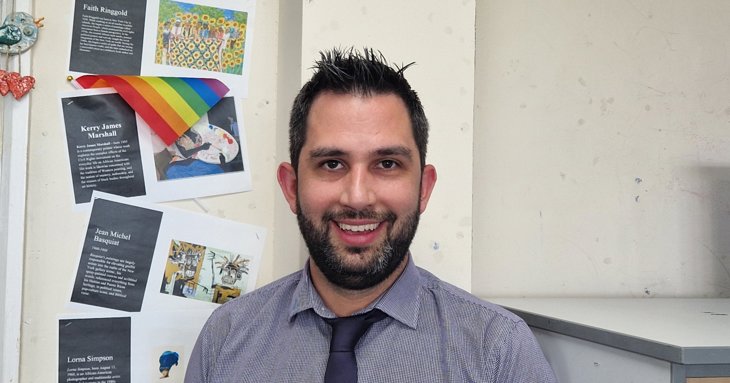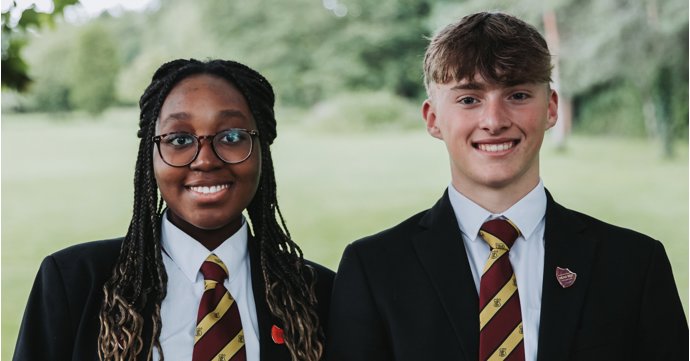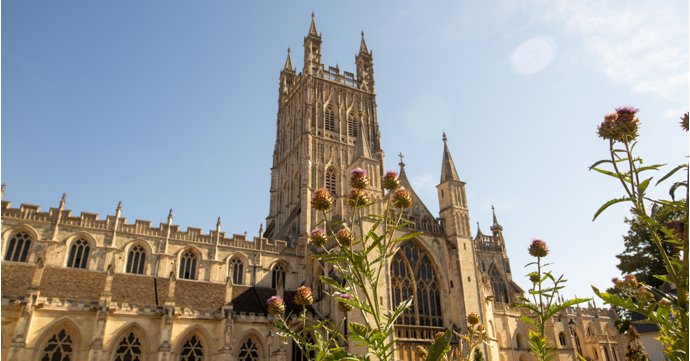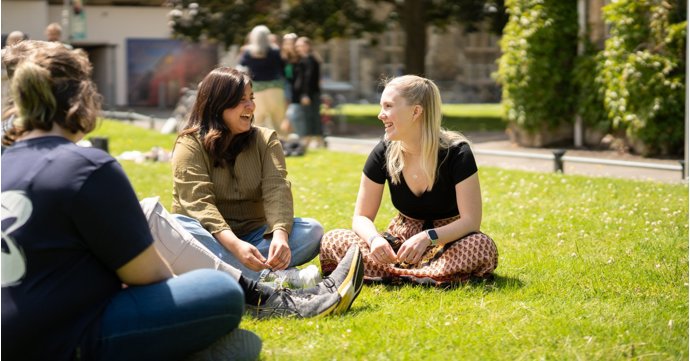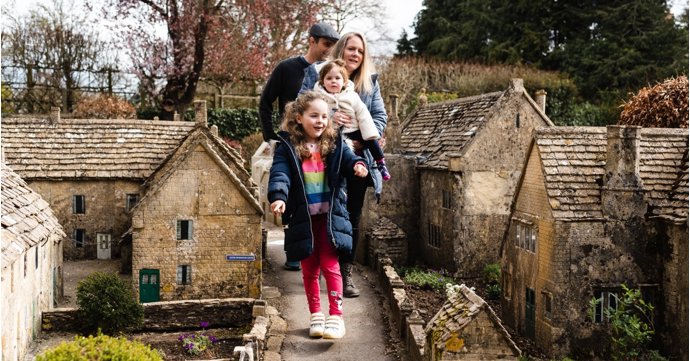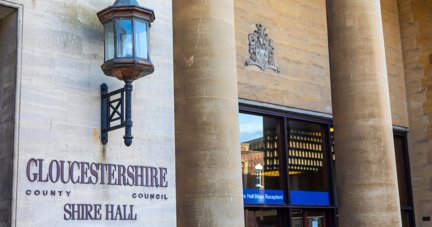Leading the way in its dedication to diversity, equality and
inclusion, The Crypt School is committed to overcoming barriers
to make every student's learning experience the best it can be.
SoGlos gets an insight into how the school supports its staff and
students to create an inclusive community from The Crypt School's inclusion
lead, Oliver Antonious — who shares why there's 'something very special' about
this Gloucester grammar school for 11 to 18 year olds.
Can you give us an idea of what a school inclusion lead does?
The role is focused on establishing and disseminating strategies that support staff in their work with our students, and especially our disadvantaged students. I strive to strengthen the school’s work, which is aimed at enhancing the inclusive nature of our curriculum, our teaching and learning practices and our wider school culture.
In this work, I also help to coordinate staff and student training needs, engaging with staff and students to find out what they feel would work best to achieve our aims. We want to empower our students and our staff — giving them the knowledge they need to ensure we have an inclusive school for all our students and staff.
The school is brilliant; I started in September and it is a wonderful place to work.
Have you been a teacher for long?
Yes, this is my 15th year of teaching. I have worked in four different schools, but there is something very special about The Crypt School community.
It sounds like your role is quite varied, but if you could describe a typical day as inclusion lead, what would that look like?
All my colleagues are committed to ensuring that we continue to strengthen our inclusive school culture and I help support colleagues to deepen their knowledge and understanding of the diverse issues that surround the broad topic of inclusion, enabling them to deal sensitively with any challenging issues that they may face in their work. Students too will often see me to have conversations around particularly sensitive areas.
We recently held one of what we call our 'community hour' sessions, which are focused on various themes and topics, many of which arise from our consultations with students, who have their own views on what they want to be discussed and promoted in these and other activities. During the recent LGBTQ+ Pride Month, our ‘community hour’ was focused on the LGBTQ+ community; their history, their struggles and the achievement through those struggles of the greater equality we enjoy in our society today. The community hour began with a student-led, whole-school assembly on the issues that face younger members of the LGBTQ+ community today and what our school community can do in support of these young members of the Crypt community.
My work is about engaging with all our students and our staff, to try to see what we can do as a school to promote values of inclusivity, acceptance and diversity. We encourage our school community to work respectfully together, learning about differences and celebrating those differences — for example, of those with different religious and cultural beliefs — whilst promoting our shared sense of being Cryptians. We always strive to do our very best for all our students.
I have an open-door policy during break, lunchtime and after school and staff can come and ask me how best to approach sensitive topics in the curriculum. Alongside of that, our student societies, such as our LGBTQ+ and multicultural societies, often welcome staff into their meetings, who seek students’ views on these and other issues: this really helps staff to further understand and promote our inclusive curriculum and wider school culture.
I also act as an advocate on behalf of these and other issues and on behalf of our students, ensuring that their concerns and priorities remain at the very centre of our rich school life. Ultimately, we are all here to make sure that our students’ learning experience is the best that it can be.
So, my role is flexible; I try to be proactive, but also respond to issues and concerns that students and staff bring to my attention.
Why did The Crypt School decide to appoint an inclusion lead? Is it a new role or is it something that was filled before you joined the school?
It was already an established role when I joined; however, I was asked to bring my experiences from other schools to augment and enhance what was already in place at The Crypt. I think the role links back to the school motto, which is for all our students ‘to flourish’ in everything that they do. This became even more important when the school moved to being a co-education selective grammar school in 2018.
It was recognised at that point, for some of our female students who joined the school in 2018, that joining a school that had previously been an all-boys’ school would have its challenges. The school wanted to ensure that its culture, its curriculum, its pastoral structure and enrichment programme offered a truly inclusive environment for them, as well as for all the other students.
So, I think the role has partially grown from our journey to become co-educational, but it is ultimately about ensuring that our students don’t have any barriers to their educational progress and personal development as young people.
Would you say The Crypt is a fully inclusive school? And if so, what makes it fully inclusive?
We’re certainly on a journey, but I know the whole staff, as well as our governors, are passionate about getting it right for our students. I think we would be naive to say we have reached our destination; indeed, we will always be working hard, working with both staff and students, to create that inclusive school community that we wish for.
I know from my work to-date that the school has the drive and the passion to get there; however, it's important to recognise that we don’t always get it right, but the thing that I like about this school is, if we do get it wrong, we apologise and learn how to do things better.
Equally, if students get things wrong, we understand and work with them to ensure they develop those accepting and inclusive values and ideas that lie at the centre of our Crypt School life.
Does The Crypt School have an inclusive curriculum?
We want to be a fully inclusive school and therefore it is important that we work hard to make sure the curriculum is inclusive, too. A lot of our teachers’ time is devoted to curriculum development, which ensures each curriculum area is inclusive of the experiences of our whole school community; that each member of our school community feels included and represented in their learning experiences in school. We make sure for example, that teachers are including a representative range of role models within any case studies or examples used. For example, the history department has worked hard towards decolonising their curriculum, to grant our young people a truly diverse representation of our past.
Reviewing and making progress in diversifying our curriculum is about enhancing the quality of education that all our young people learn and progress within.
Our work in school, through our curriculum and in many other ways, is about giving the students the evidence, the ‘facts’ so to speak, but from differing perspectives, which enables a holistic understanding of their world, its challenges its achievements and the opportunities open to them in the future to develop over the course of their education at the school. We aim to offer students the knowledge and understanding of their world, of our society for example, and which is intended to enable them to make their own informed decisions, as well as being able to develop their own views.
Have you received any feedback from students or parents about the curriculum and how it’s developed?
Yes, absolutely. For example, I receive the minutes from our
student parliaments — we have about four or five of them in school — and there
is one specifically for the curriculum. These student-led parliaments are
feeding back that they acknowledge that the school is striving to update,
modernise and be more responsive, not only to the changing nature of our
society and workforce, but also to the school’s increasingly diverse student body.
Do you have any specific measures in place to ensure that all students have equal opportunities?
The school has many measures in place to collect useful data, which grants us a rich picture of what we are doing well and areas that we need to improve.
The students have two assessment windows each academic year, as well as more regular ‘data drops’ and numeric reports about their progress, attainment and effort. This wealth of data enables the school to analyse the impact of our work and the curriculum across each year group. This helps us to reflect and improve further upon our practice, if particular groups have not done as well compared to others, such as girls or SEND students for example.
How does The Crypt School tackle discrimination?
We deal with it robustly and fairly.
We always try to deal with any discrimination from an educational perspective in the first instance: that is because the school recognises that students can make mistakes. In challenging any discrimination, we will also seek the support and guidance of our wider community, including our parental and carer body — so we can both tackle and eliminate any discrimination together.
Our priority is to both support students who may experience discrimination, either in school or within the community; as well as putting in place interventions to help educate those who have expressed hurtful or harmful views and which are not compatible with our inclusive school culture. We may well use a sanction; however, our focus here is on the education of the individual, which may include them being off timetable for a period of time to undertake some work that will help them understand the impact that their words or behaviours have on others. That process, we find, is hugely beneficial and successful.
We also do preventative work, such as our 'community hours' sessions mentioned earlier and much of that wider educational work occurs within form tutor time, in personal development lessons, in other lessons or in assemblies. This wider work grants students an understanding about the challenges that many people in our school and wider communities face, as well as the knowledge they need to help develop that inclusive school community and society we all wish to be part of.
Could you tell us a little bit more about the school’s equality objectives?
The Crypt School has three equality objectives for 2023/24:
- To ensure that the school’s curriculum vision for inclusion is implemented in lessons; that there are a range of opportunities to celebrate differences in our work in school and that we enhance students’ understanding of the diversity of our school community and that of our wider society, to which we all belong.
- To consider the school’s use of language and whether that language reinforces 'stereotypes' that do not accurately represent and celebrate our school values, and our diverse school community of staff, students and of their families.
- To celebrate the successes and raise the attainment and participation in school life of students who are pupil premium, from an ethnic minority background, or have special educational needs.
Have you met the equality objectives for the last academic year?
We have worked hard to do so, and I feel very proud of the progress that we have made in a number of areas. For example, ensuring that every one of our students has the very highest expectations of themselves and that everyone in school believes that every student can succeed at the very highest levels through a shared commitment to ensure they think hard, learn deeply, and develop a secure understanding of the wide range of subject areas under study.
Challenge and support for all students is embedded in our curriculum and in our approach to teaching and learning, through which the school promotes high level thinking. All students are supported so that they can understand high-level concepts and successfully complete complex tasks.
A positive learning atmosphere for all is created where effort is praised, and intellectual curiosity promoted. Relationships at The Crypt are built on respect and trust and expectations for good behaviour are made explicit.
Developing an inclusive school culture and curriculum is a truly collaborative process. I’ve worked at lots of schools where, quite often in this area, you come up against a lot of barriers to achieve that ambition; however, at The Crypt, I’ve not experienced that — together, we’re constantly learning and evolving and it has been wonderful to be part of that shared journey.


